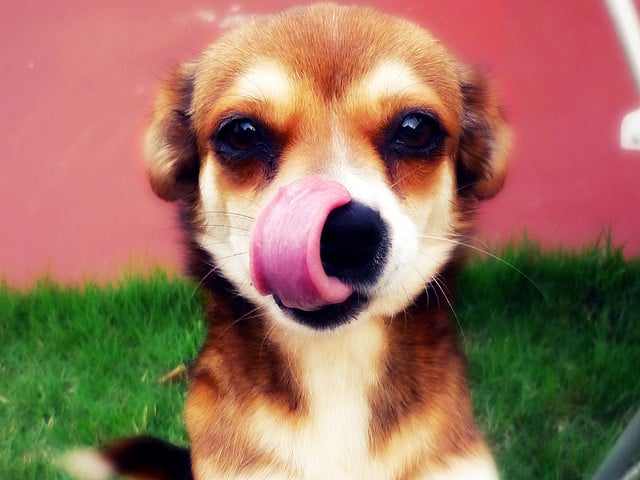Image Credit: Flickr: Mariana Zanatta
Who can say no to the big, soulful brown eyes of your dog looking up at you as you are cooking or eating? Well, sometimes you just have to say no. It’s for the dogs own good, after all. Something that may look like a harmless piece of chocolate could be fatal to your four-legged companion. Here are five of the most commonly overlooked foods that seem harmless but can actually seriously harm your dog.
5 Dangerous Foods for Dogs
- Onions
- Grapes or Raisins
- Chocolate
- Macadamia Nuts
- Caffeine
While these items are harmless and potentially beneficial for humans, these items could be problematic and/or deadly to canines. As no-one wants to have to rush their dog to a vet, it is important to remember that humans and dogs are very different and therefore it is important to recognize those differences by ensuring your dog never gets human food and that you do not give your dog human medication without first consulting a vet.
There can be serious consequences if you attempt to diagnose a dog’s illness at home and attempt to treat them without proper veterinary care, particularly if the medication you are attempting to use is for humans. Many ingredients are fatal to dogs and/or have different concentrations/dosages to canine versions of the same medications. Therefore it is always important to contact a qualified veterinarian prior to medicating your dog in any way.
Onions
Most dogs will not eat raw onions however often onions are in a number of ingredients dogs will happily eat such as fried onions on a hot dog, onion soup with beef broth or even your onion rings. They do not need to eat a lot for symptoms to become evident and potentially fatal.
Chemicals in an onion cause the red blood cells to carry oxygen inefficiently and to clump together. This is easily spotted when blood is drawn and viewed under a microscope and treatment can begin at this point. However, often when a dog that has eaten onions becomes sick, it is not apparent for quite some time and may become anemic without obvious cause. At this point the anemia needs to be dealt with, the dog will need to be hospitalized and may need blood transfusions.
Grapes or Raisins
Grapes are wonderful, sweet and an excellent source of vitamins for humans. For canines, however, even the smallest amount can be toxic. There is little time between the point that the dog steals the grape that fell on the floor to the point that they are dealing with vomiting, abdominal pain, and potential kidney failure which can lead to death.
If your dog has eaten either a grape or a raisin it is important they get to a vet as soon as possible because despite the fact not all dogs react as violently towards grapes and raisins, the chances are not in your dog’s favor and often there will be mere hours between the time of ingestion and the time of serious symptoms.
Chocolate
One of the most well-known foods that do not agree with dogs that are fine for humans is chocolate. One thing that you may hear is “I gave Fido a whole box of chocolates and was fine. There is no harm in it.” While it is good to hear Fido was not harmed by their owner’s poor judgement, there are reasons this may have happened. Not all chocolates are created equal.
While 7 ounces of milk chocolate would have a 50-pound dog showing mild symptoms of irritation and a mess all over the carpet, 7 ounces of dark chocolate would require immediate medical attention and the same amount of bakers chocolate is fatal if left untreated.
A dog’s size also comes into consideration. While the 50-pound dog will have mild symptoms at 8 ounces of milk chocolate, the same amount for a small dog, such as a Yorkshire Terrier, would be fatal.
As such, it is not worth the risk for something a dog does not need in their diet. If you must give your dog chocolate, there are specialty white chocolate candies made specifically for dogs although caution should be taken that no cocoa is anywhere in the ingredients.
Macadamia Nuts
Macadamia nuts are found in cookies and other desserts and are unfortunately toxic to dogs. While it is not fully understood what causes dogs to react to macadamia nuts so violently, it does not take much for them to do so. At only 2.4 g of nuts per kilogram of body weight, macadamia nuts can cause vomiting, hyperthermia and/or tremors due to muscle weakness. Often dogs do not require treatment and will make a full recovery without any intervention although your rug may never look the same. Dogs who have eaten a significant amount may need to go to the veterinarian to be given IV fluids and to have their vitals monitored to ensure they make a full recovery.
Caffeine
Caffeine is found in many of our day-to-day diets. From coffee and tea, to soda and diet pills, caffeine is everywhere and although a small amount may not harm your dog, if they should get a hold of coffee grounds, a diet pill or other form of concentrated caffeine source, it can easily cause the dog to have a heart attack and die.
If you notice your dog has ingested anything which contains caffeine, it is important to seek veterinary care as soon as possible where they will likely attempt to induce vomiting and feed the dog charcoal to attempt to neutralize the caffeine. Sedatives, IV fluids, seizure medications and antacids are just a few of the medications your dog may be given to attempt to control the symptoms while the charcoal is working. Unfortunately, even with treatment, dogs who have severe signs such as seizures often are treated in vain.
